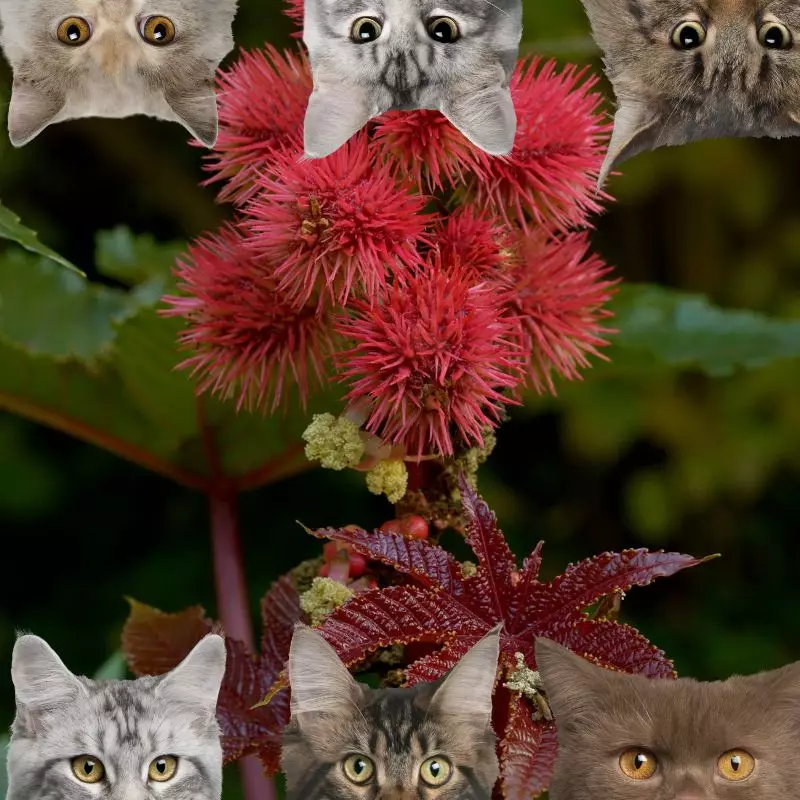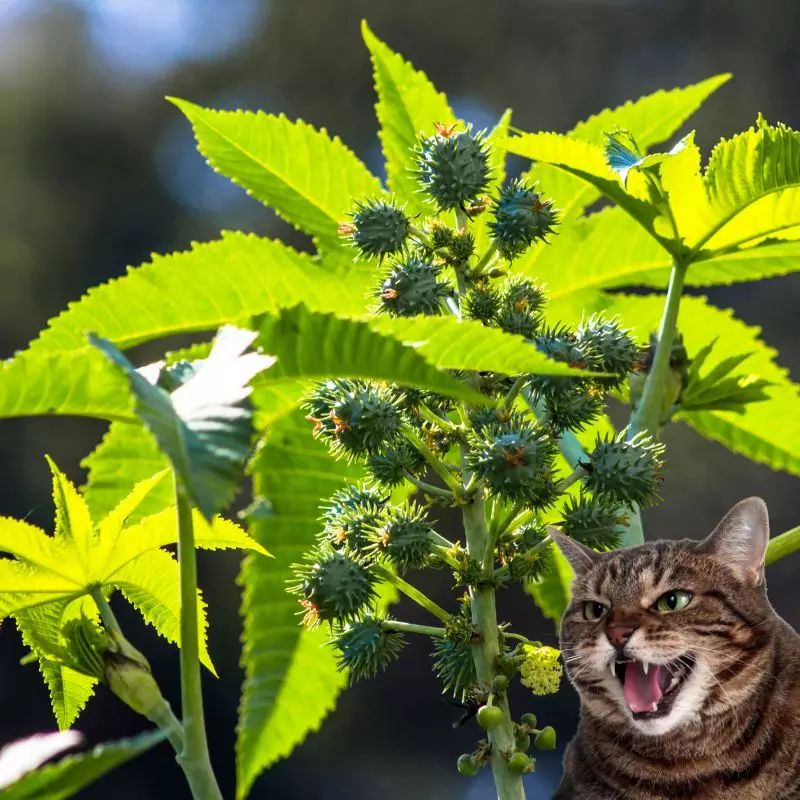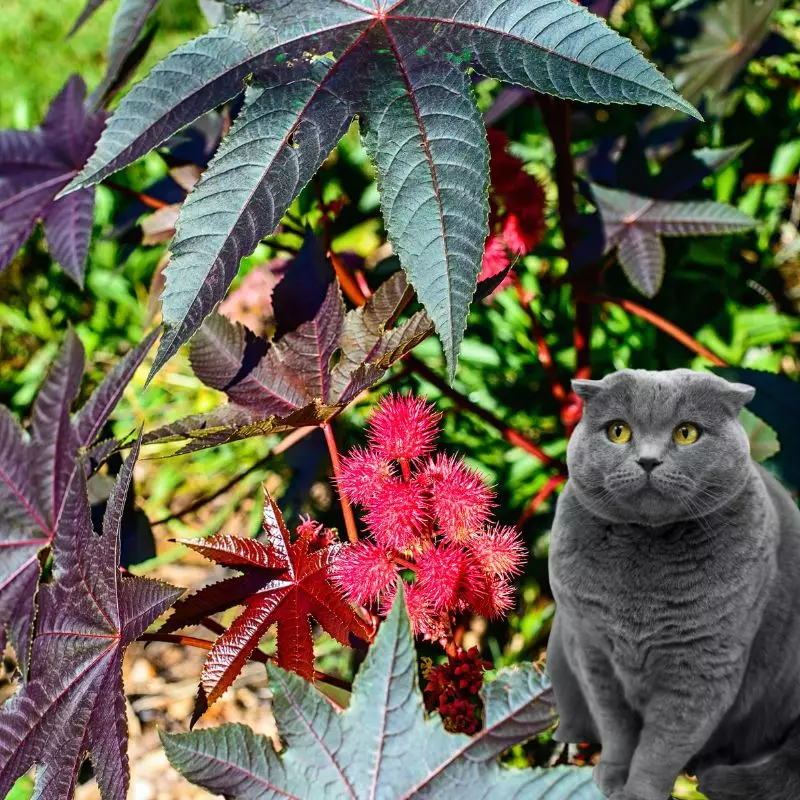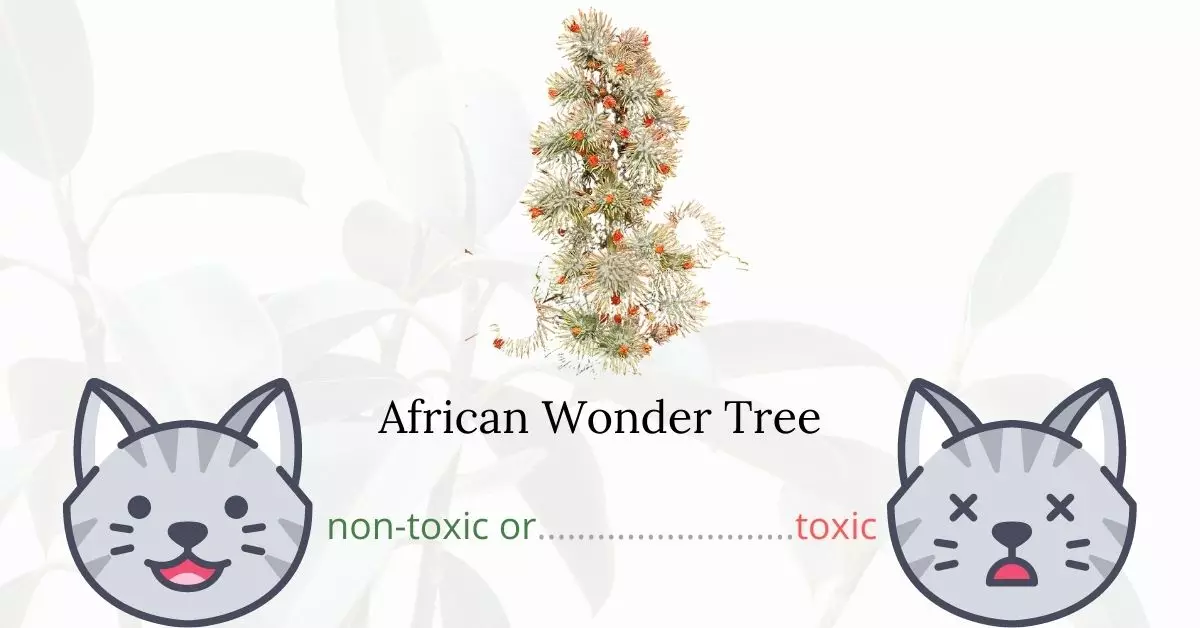Yes, the African Wonder Tree, also known as the Castor Bean Plant, Castor Oil Plant, and Mole Bean Plant, is toxic to cats. Every part of this plant, especially the seeds, contains ricin, a glycoprotein that inhibits protein production in the body. If ingested by cats, it can lead to severe health issues, including potential organ failure.
This article was collaboratively crafted with input from a team of seasoned DVMs (doctors of veterinary medicine). Leveraging their expertise and our extensive research from reputable sources like ASPCA and PetMD, we aim to provide precise and current insights regarding the dangers of various plants, focusing on the African Wonder Tree in this context.
Clinical Signs of African Wonder Tree Poisoning In Cats

When cats come into contact with the African Wonder Tree, they exhibit a range of symptoms depending on the mode of exposure – be it topical, oral, or inhalation. The severity of these symptoms also corresponds to the amount consumed or absorbed.
1. Topical Symptoms
- Swelling: This occurs due to the body’s inflammatory response to the plant’s toxic compounds.
- Redness of Skin: The skin reacts adversely to the toxins, leading to inflammation and redness.
- Pain or Itchiness in Affected Areas: Irritation caused by the toxins can produce a painful or itchy sensation.
- Puffy Eyes: If the cat rubs its eyes after coming into contact with the plant, the toxins can cause inflammation and swelling.
2. Oral Symptoms
- Appetite Loss: The toxins affect the cat’s digestive system, making them feel unwell and unwilling to eat.
- Coma: Extreme cases can affect the cat’s central nervous system, leading to unresponsiveness.
- Convulsions: Result from the nervous system’s reaction to the toxin.
- Diarrhea with Blood: The plant’s toxins irritate the gastrointestinal tract.
- Dyspnea: Difficulty in breathing due to internal inflammation.
- Depressed Nervous System: Due to the ricin’s effect on the nervous system.
- Dilated Pupils, Excessive Thirst, Fever: General symptoms of bodily distress and systemic toxin impact.
- Hallucinations & Lack of Coordination: Result from the toxin’s impact on the brain.
- Pain in the Abdomen: Due to gastrointestinal disturbance.
- Sunken Eyes from Dehydration: Result of fluid loss from vomiting or diarrhea.
- Vomiting & Weakness: Direct consequences of the body trying to expel the toxins.
3. Inhalation Symptoms
- Blue Tinge on Skin and Mucous Membranes: Indicates oxygen deprivation due to toxins affecting the respiratory system.
- Pain in the Chest & Shortness of Breath: Inflammation and constriction of the respiratory tract.
- Cough: Reaction to irritants from the smoke.
- Rapid Heart Rate, Fever, Nausea: Systemic reactions to the inhaled toxins.
- Respiratory Failure & Trembling: Severe cases can lead to the failure of the respiratory system and trembling due to lack of oxygen.
- Weakness: Overall decline in energy as the body battles the inhaled toxins.
Each of these symptoms is a direct manifestation of the toxic properties of the African Wonder Tree, especially its potent compound, ricin. Immediate veterinary attention is essential if a cat displays any of these symptoms after exposure to the plant.
First Aid And Treatment of African Wonder Tree Poisoning In Cats

Since the symptoms of African Wonder Tree poisoning are severe and may be lethal to your cat if not taken care of right away, it is better to consult your vet right away. The first 48 to 72 hours are very crucial so your cat has to be monitored closely by the vet.
A physical examination will be performed by the veterinarian, as well as essential laboratory tests to check the condition of your cat’s internal organs. An electrocardiogram (ECG) can be used to track your cat’s heart activity. Your cat may also require IV fluids, oxygen, and blood transfusions from the veterinarian.
Recovery of African Wonder Tree Poisoning In Cats

If your cat is fine after the 72-hour mark, the outlook is favorable as long as there is no organ failure or injury. The veterinarian will request you to return in 7 to 10 days to repeat some laboratory tests, and if the results are normal, your cat should be fine.
Prevention of African Wonder Tree Poisoning In Cats
As much as possible, avoid growing or places with African Wonder Trees. Ensure your feline’s safety by keeping them busy with indoor activities. Maintain their good and healthy condition by supplying food and lickable to prevent them from consuming anything outside your home.
If you love plants but have cats at home, check out these lists:





